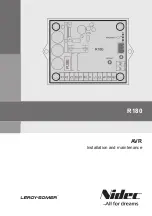
www.atestgaz.pl
5.11
Buzzer – internal acoustic indicator
Sigma Control L Unit module has a built-in internal acoustic indicator, called a buzzer. It is designed to
generate an acoustic signal when operator intervention can be necessary, including a gas risk or system
component fault.
The buzzer is triggered when:
gas alarms, i.e. when warning level 1 or 2 and alarm are reported by any of the detectors
connected,
fault, i.e. a critical fault of any detectors connected appears, loss of communication and in the case
of Control Unit Module critical fault.
The triggered buzzer generates an acoustic signal, modulated, 0.5 s sound, 0.5 s silence.
The buzzer can be muted for a certain period (temporarily deactivated). Then, even when the triggering
signal remains, the buzzer does not generate any sound. However, if the deactivation time expires, and the
triggering signal is still active, the buzzer resumes its operation (reactivates). If during the time of buzzer
deactivation a new gas alarm
occurs or a fault, the buzzer resumes its operation. When the source of
triggering stops, the buzzer turns off.
The buzzer can be disabled by the keyboard (see section 5.9) and External DIs (see appendix [2] and [3]).
The mechanism of temporary deactivation is treated separately for gas alarms and faults. Possible
deactivation times include:
for gas alarms: 1 – 90 minutes,
for faults: 1 – 168 hours (1 week) and infinite time (the buzzer will not reactivate).
The values of the above listed parameters can be pre-set by the user from the unit menu level (see section
5.9).
Below is a time diagram for maintaining internal acoustic signal (it was assumed that the trigger signal is
a gas alarm and deactivation is perfumed by a push button):
5
New gas alarm means exceeding the upper alarm threshold at any detector or a threshold at any other detector.
p. 28|38
User's Manual: POD-026-ENG R17
















































